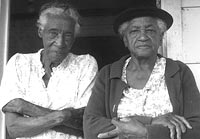SCHR Executive Director Terrica Ganzy Reflects on Judge Ketanji Brown Jackson’s Confirmation to the US Supreme Court
My grandmother, Birdie Lee Walker, along with her sister Matilda Schoby and their cousin Ernest Isaac, were the first Black people to register to vote in Liberty, Mississippi in the summer of 1961. At the time, they could have been killed or assaulted and it is likely that no one would have been held accountable. But they lived to tell the story, and now at 103 years old, Ms. Birdie has seen a lot in this life. This week, she rejoiced in witnessing the confirmation of the first Black woman to the United States Supreme Court, Judge Ketanji Brown Jackson.

In historic moments like these, I think of my grandmother and all the women like her who beam with pride at this dream come true. I also think of all the women who fought for this moment but didn’t live to see it. We salute Judge Ketanji Brown Jackson on her monumental and well-earned achievement, as she lives out the dreams of our ancestors while paving the way for future generations.
I was inspired by everyday leaders like so many of the women who ceaselessly worked, often in the background, to improve their communities for the better. I chose criminal defense work where I witnessed the indignity and oppression suffered by people ensnared in our criminal legal system, and I am proud to have joined the Southern Center’s fight for equality, dignity and justice, representing people who are experiencing poverty and the most marginalized on death row.
I am proud, too, that Judge Ketanji Brown Jackson, our next US Supreme Court Justice, also knows what it means to stand with and fight for the accused and people who are often marginalized in our society. Indeed, in her time as a public defender, Judge Jackson ensured that one’s access to justice didn’t rest on their income, work that goes to the heart of everything SCHR does.
In her acceptance speech, Judge Jackson acknowledged that she stands “on the shoulders of generations of Americans who never had anything close to this opportunity,” on the shoulders of generations of Black women like my grandmother Birdie and great aunt Matilda who fought low expectations, achieved what many deemed impossible, and dedicated their lives to service.
As the first Black executive director of SCHR, a lawyer, and a mother of two Black boys, I cannot overstate the power of this historic confirmation. Representation really does matter, and Judge Ketanji Brown Jackson represents so much that is noble about the legal profession, so much work well-done, and so many dreams come true.
Congratulations, Judge (and soon to be Justice) Ketanji Brown Jackson!